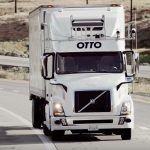 Whilst driverless cars have received significant media attention, there is just as much research, and commercial, interest in driverless trucks. Indeed, earlier this year saw a convoy of six semi-automated trucks make their way across Europe to the port in Rotterdam in ‘platoon’ style whereby a number of trucks are run very close to each other to thus reduce fuel consumption.
Whilst driverless cars have received significant media attention, there is just as much research, and commercial, interest in driverless trucks. Indeed, earlier this year saw a convoy of six semi-automated trucks make their way across Europe to the port in Rotterdam in ‘platoon’ style whereby a number of trucks are run very close to each other to thus reduce fuel consumption.
The transition from a human powered vehicle to one operated by a machine however is still somewhat uncertain. A glimpse into how this transition may unfold however comes via a new startup called Otto.
Driverless trucking
The company, which was created by a group of former Google employees, initially developed tools to help drivers, but as the technology has evolved it is increasingly capable of taking full responsibility for the trucks.
The technology turns a traditional commercial truck into a self-driving vehicle, with the company recently announcing successful test drives of the new package, which you can see in the video below.
Whereas traditionally, the transition to driverless technology would require a completely new vehicle, the Otto service merely provides a modification of an existing truck. The device, which costs around $30,000, keeps the vehicle in a single lane and at a constant speed, albeit with the capability to stop if required.
A driver will probably remain in the cabin, and Otto is capable of alerting them should they need to intervene. If the driver fails to respond to this request, Otto will find the nearest safe spot and pull over.
It is currently working with a number of regulators to ensure the technology is legally allowed to operate, but with the technology costing a mere fraction of a new rig, it might be a telling glimpse into the way we will transition to a driverless world.
Check out the video below and let me know your thoughts in the comments.
Respectfully, I am not sure that lorry safety would improve.
Google cars are limited to 50 kph and people still fear to let them on the street. A 40 ton lorry speeding 90 km per hour is an unstoppable destructive force, with completely different control problem than a tiny soapbox car. Think of a deer crossing the road, or road works.
Small trucking firms will not adopt the technology. The industry will become even more capital intensive, and large firms with low finance costs will dominate.
Specialist depots with their own highway exits and entrances will limit the need for self-driving trucks to navigate city streets. Drivers will still be used to drive from depots to destinations, but relatively few depots could take most of the long haul truckers off of the road. Truck driving will still be a job, but it will be for trips of two hours or less.
Otto joins Uber https://blog.ot.to/our-next-chapter-otto-joins-ub…
Wow, that's a huge payoff for the employees. I don't think they took any outside money. Less than a year to $680m.
These things are going to be programmed to avoid other vehicles at all costs. If they are ever fully automated I foresee some ex-truck drivers pulling up beside these things on the highway and running them off the road. Robot drivers are poised to displace more workers than factory automation and unless we go to a universal guaranteed wage system there is going to be serious pushback.
That's an excellent point. As we saw the French taxi drivers staging massive disruptive protests over Uber, I agree that this will very likely play out on highways. With so many truck drivers soon to face unemployment, it would play out as self preservation to devote time/energy/money to derailing automated trucking before the pilot programs see success.
If it's about to become a massive problem I can see something similar to the UK's 2000 fuel strikes, drivers were blockading oil terminals and causing rolling roadblocks on major roads.
I still think us truckers have more time than most of Reddit seems to think though, there's so much more to think about than just that 300 mile drive down a motorway.
If you're going to automate a 40 tonne truck you damn sure want to believe 100% in its capabilities before you send it through a populated city. There's also the issue of loading and unloading to think of, not all drops are simply backing onto a bay and letting warehouse staff unload there's lots of construction materials that need tipping in the right place, plant machinery getting delivered to the middle of nowhere, small pallets/cages/stillages being delivered to high street shops/companies and even swapping trailers at destinations.
There will almost certainly be a transition period where drivers are still on hand to perform those duties and repairs.
That sounds a bit dramatic. It's going to take at least a decade before 100% of highway miles are being driven autonomously. Plenty of time for younger drivers to find other sources of income or for older drivers to age out of the work force.
Okay so late at night driving on a one lane highway and an animal runs out in the road, but there's an oncoming car. What does it do? Kill the animal or run into the oncoming car? Or just completely run off the road?